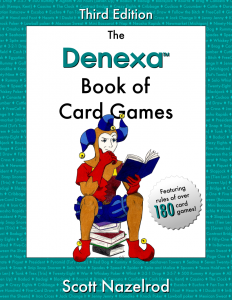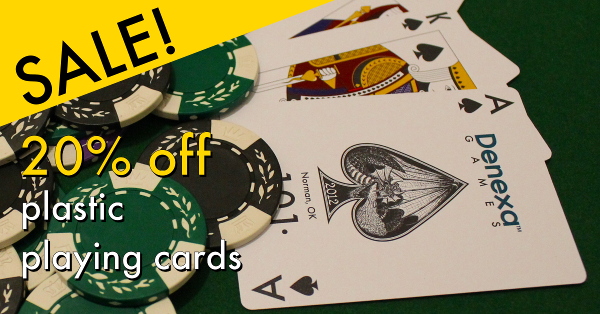Red Dog
Much like Seven Twenty-Seven, Red Dog is a fun game you can put into your dealer’s choice poker nights as a break from actual poker. Red Dog makes a nice respite from the competitive betting found in other games, because all of the betting in Red Dog is done against the pot, not other players.
Object of Red Dog
The object of the game is to win lots of money when your hand is favorable and to not lose lots of money when it isn’t. But then, that’s every poker game…so….
Setup
You need one standard fifty-two card deck of playing cards. If you’re using Denexa 100% Plastic Playing Cards, you’re awesome and we love you. You also need to determine a minimum bet—if you’re a friendly bunch, it will be equal to whatever your lowest chip value is. Masochistic groups of players can set it higher.
All players ante. Shuffle and deal four cards to all players.
Game play
The player to the left of the dealer goes first. They make a wager of any amount of money, between the minimum bet and the amount in the pot, based on the perceived strength of their hand. Then, a fifth card is dealt face up. If they have a higher card of the same suit as the fifth card, they expose it. The bet wins, and the dealer pays the player an equal amount from the pot. If the player doesn’t, they expose their hand and the dealer adds their bet to the pot. The next player to the left plays in the same manner. Exposed cards remain on the table as each player plays their hand, giving the players later to act more information about the composition of the deck.
After the dealer’s turn of play, any money left in the pot remains, the cards are collected and shuffled, and the deal passes to the left. Game play continues until someone takes the entire pot by making a bet equal to the whole pot (colloquially potting it) and winning. Occasionally, the size of the pot will climb to ridiculous proportions due to several attempts to take the pot failing catastrophically. If, out of fear or boredom, all players agree to end the game early, the pot is simply split as evenly as possible between all players, with whatever remainder exists staying in the pot as a splash-pot bet for the next game.
House rules
If you want to allow players to have some more information, and thus allow them to make more informed judgments about their hands, deal the hands face up—this also makes the order of play slightly less important, and adds a more lively atmosphere as people suddenly begin to have strong opinions about each others’ play (“C’mon, Bill, pot it! You can’t lose! Well, you probably won’t, anyw—ouch, bad luck, man…”). If you want to give them even more information, deal the whole deck out, rather than shuffling between hands. This allows players to take advantage of knowledge they remember from prior hands.


